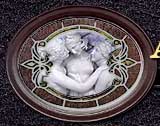|
Literary Commentary: Faustus
For a Renaissance man meant to be brilliant in the existing sciences, Dr. Faustus cannot seem to
live up to the potential of the Renaissance ambition. He is willing to push past limits in a quest
for ultimate knowledge, but upon receiving the means to do so, seems content to remain mediocre
with his power. Despite a supernatural servant at his beck and call for two dozen years, Faustus
is pleased merely to conduct small parlor tricks to admiring nobility and play pranks on people
instead of pursuing grand schemes. This is punctuated by showing lesser scholars and even a clown
obtaining magical ability, and doing much the same thing. Did Faustus make his bargain because of
a desire for greatness, or was he just bored with what he could glean from mundane sources?
He also doesn't seem to really accept the reality before his eyes. While he summons devils and
converses with them, and is impressed by the display of the Deadly Sins, he still casually
dismisses the concept of Hell as merely the same world in which he already lives. It makes sense
storywise for a protagonist to ignore the risks when intoxicated with the promise of power, but
Faustus is deliberately blithe, and is easily convinced or browbeaten into staying on Lucifer's
side. Only near his end does he seem to regain his dignity and his sublimity.
What intrigues me is the almost-sympathetic character of Mephastophilis, who describes his own
suffering and actually warns Faustus against accepting the hellish bargain. Instead of a leering
caricature of evil, wringing his hands in greedy expectation of Faustus' soul, Mephastophilis is
a fully developed personality. I imagine this is to provide a parallel to Dr. Faustus:
Mephastophilis was also rebellious - his pride and rejection of God causing his downfall - but as
he has terrible insight into what it means to be lost from Heaven, he seems to want Faustus not
to imitate his doom. However, he still functions capably as Lucifer's enforcer when Faustus begins
to waver from his dark promise.
He is helpful as far as his employment goes, but it is difficult to create a story with an
all-knowing being who can answer the great questions of Life, because information is limited to
the knowledge of the author. For instance, questions about the structure of the world and the
heavens reveals the geocentric outlook of Marlowe's time. Marlowe, did, however, neatly skip the
difficult question of the creation of the universe.
Marlowe keeps the medieval paradigm of eternal damnation, but introduces a new possibility that
there can come a point where nothing will reverse one's downfall. It also indicates that a man
should be unable to truly grow beyond his limitations unless he deals with the supernatural -
that education and ambition is not enough. It makes me wonder if Marlowe thought ill of all the
new sciences, which cast aside limits and stretched humankind's potential; to think of such is to
tempt God's wrath.
For Reference:
Christopher Marlowe's Doctor Faustus
David Elsensohn, April 2005
Return to Essays
| 
